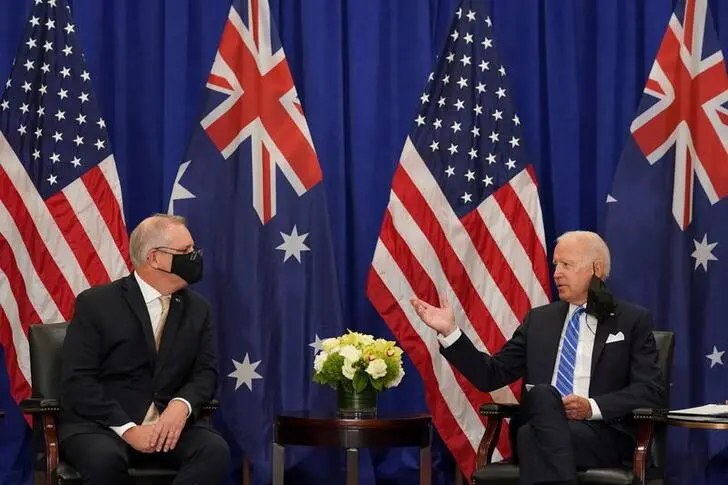PHOTO
Australia is not a country usually associated with being at the center of great power rivalry, but the new AUKUS security partnership announced by Australia, the UK and the US positioned it right at the heart of the competition between the US and China.
The leaders of these countries, in their virtual announcement of this military alliance, carefully avoided mentioning China by name, but there was no need to. Containing China in the Indo-Pacific has become top priority for the US and its allies, and supplying Australia with nuclear-powered submarines is another tier in this mission.
There is something dazzling in the speed with which the current US administration is shuffling its strategic cards. It is rapidly setting a new, ambitious and determined international agenda, one that is relentless and pays little heed to criticism. America hasn’t exactly covered itself in glory over Afghanistan, but the hasty and chaotic withdrawal from that country, together with the swift emergence of AUKUS, shows a ruthless streak in its global repositioning.
For the Biden administration, as for Boris Johnson’s in London and Scott Morrison’s in Canberra, the issue keeping officials awake at night is China’s ever-increasing military capabilities and foreign policy assertiveness — some might argue aggression. In the process of accomplishing their mission, all three partners were prepared to upset France by canceling Australia’s $90 billion submarine contract, which became mere collateral damage worth inflicting for the sake of entering into a “forever partnership,” as it was touted by Morrison.
Coalescing in this collaboration is both a geostrategic development of the highest importance and an impressive achievement for all three countries involved, but it is not without risks. For Biden, it is a manifestation of his statement early in his presidency that “America is back” and that American leadership means, among other things, standing up to the challenge of advancing authoritarianism, “including the growing ambitions of China to rival the United States.”
While Biden likes to emphasize the return of diplomacy to the center of US foreign policy, AUKUS feels more like gunboat diplomacy. It is especially remarkable that Australia is entrusting its long-term security to an alliance with the US in light of recent events in Afghanistan and, more generally, of America’s track record of abandoning its allies at the drop of a hat once they have served their purpose or become an inconvenient burden in Washington’s eyes.
Australia left itself no room to maneuver before joining this security troika, following the constant deterioration in its relations with China. In the early days of his premiership, Morrison tried to walk the tightrope of maintaining close relations with both China and the US. He was adamant that Australia could retain close ties with its largest trading partner, China, without harming relations with its close security ally, the US. However, Canberra’s own actions made it clear that its priorities, at least since 2017, had shifted toward siding with the US out of concerns for Chinese intentions and that it was prepared to take the economic risk that came with such a move.
Australia’s formal ban on the Chinese telecommunications giant Huawei was the first by any country and is still a source of irritation in Beijing. Its anti-foreign interference law was aimed first and foremost at China, and Morrison’s call, ahead of any other leader, for an inquiry into the origins of the COVID-19 pandemic aligned Australia closely with the US in the Washington-Beijing rivalry.
Therefore, AUKUS is not a surprising development, but rather an evolutionary step, or regression, in the growing tension between two global powers, with some striking and worrying similarities to the Cold War, including its spread to different parts of the world — although, for now at least, without the threat of nuclear cataclysm.
While the US and the UK historically see Australia as an ally with strong cultural ties, for China, Australia is its backyard. However, by the same token, China is expanding economically and building its political influence in other areas of vital interest to it, including Latin America and the Middle East. China, by complementing its economic prowess with building the world’s largest navy (though not necessarily the most powerful), raises the classic realist “security dilemma” of whether its intentions are defensive or expansionist in nature.
For the West, there is also genuine concern at China’s repressive and authoritarian behavior at home. And, for Beijing, Hong Kong and Taiwan are perceived as domestic issues, rather than foreign affairs items, and both territories may eventually face military intervention. AUKUS is one of the answers to this strategic thinking, translated into a huge investment in military hardware while increasing tensions with Beijing, but it also has strong ideological undertones.
For anyone entering such a partnership with the US, there must be at least a grain of doubt whether this commitment will last beyond the current administration, especially given the duration and perseverance required to make a genuine change in the regional balance of power. America’s current volatile political system doesn’t guarantee that any administration will last more than one term and, as became apparent with the last administration, new presidents don’t necessarily feel obliged to stand by commitments made by their predecessors.
Another source of concern is that AUKUS looks certain to accelerate an already existing arms race in the region, and for now it is hard to tell whether this was factored into the partners’ calculus. Moreover, to increase military capabilities through AUKUS may be a necessary step, but could it go beyond deterrence and lead to diplomatic negotiations to reduce the rising temperature between Washington and Beijing? This is unclear. For now, it is more likely to enhance mutual suspicion and perception of the other side as an aggressor.
China’s embassy in Washington reacted to the new trilateral pact by advising the US, the UK and Australia to “shake off their Cold War mentality and ideological prejudice.” That may sound rich coming from a Chinese official. However, judging by the language on both sides, it seems that the Cold War-like horses have already bolted and AUKUS is no more than the latest illustration of this.
• Yossi Mekelberg is professor of international relations and an associate fellow of the MENA Program at Chatham House. He is a regular contributor to the international written and electronic media. Twitter: @YMekelberg
Copyright: Arab News © 2021 All rights reserved. Provided by SyndiGate Media Inc. (Syndigate.info).





















